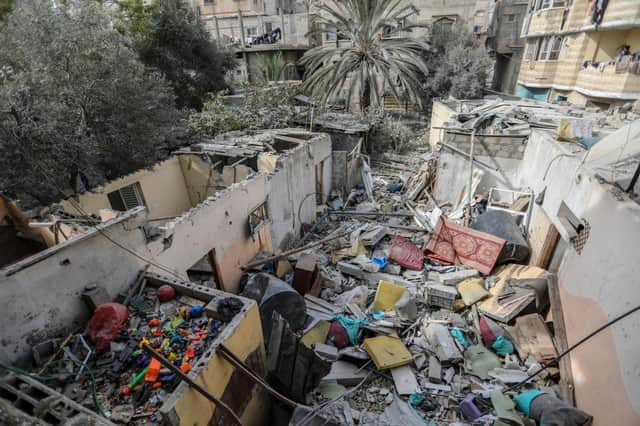Chances of ceasefire in Gaza fading, mediator Qatar warns


Chances of a ceasefire in Gaza are fading, mediator Qatar has said, as Israel said it was prepared to fight for months or longer to defeat Hamas – and Hamas warned no more hostages would leave Gaza alive unless its demands for a prisoner exchange are met.
Qatar said efforts to stop the war and have all hostages released will continue, but a willingness to discuss a ceasefire is fading.
Advertisement
Hide AdAdvertisement
Hide AdIsrael’s ground offensive has intensified, with more airstrikes and artillery fire, as humanitarian groups warned of a breakdown of order on the Rafah border as thousands of people flee other parts of the territory.
Israel says Hamas still has 117 hostages and the remains of 20 people killed in captivity or during the 7 October attack. Most remaining hostages are soldiers and civilian men, and the militants hope to exchange them for Palestinians imprisoned by Israel.
Israel's prime minister Benjamin Netanyahu has claimed dozens of Hamas fighters are "laying down their weapons and handing themselves over". The Israeli government has pledged that it will not stop until it has removed Hamas from power in Gaza and dismantled its military capabilities.
In a statement on Sunday, Mr Netanyahu said the "war is in full swing" and full defeat will take more time, but added that it is "the beginning of the end for Hamas".
"I say to the Hamas terrorists: it is over. Don't die for [Hamas chief Yahya] Sinwar. Surrender - now," he said.
The United Nations’ humanitarian office said it was struggling to distribute aid within Gaza. About 90 per cent of Gaza’s 2.3 million people have been displaced within the besieged territory, where UN agencies say there is no safe place to flee.
"Aid distribution in the rest of the Gaza Strip has largely stopped over the past few days due to the intensity of hostilities and restrictions of movement along the main roads,” the United Nations Office for the Coordination of Humanitarian Affairs (OCHA) said.
Advertisement
Hide AdAdvertisement
Hide AdThe body warned of “extreme overcrowded and dire conditions both inside and outside shelters” as thousands of people, displaced from areas where hostilities have intensified, collected near the Egyptian border.
"They wait for hours in large crowds around aid distribution centres, in desperate need of food, water, shelter, health, and protection,” OCHA said. “In the absence of an adequate number of latrines, open-air defecation is widespread, increasing concerns of the spread of disease particularly during rains and related flooding.”
Residents said there was heavy fighting in and around the southern city of Khan Younis, where Israeli ground forces opened a new line of attack last week, and battles were still underway in parts of Gaza City and the built-up Jabaliya refugee camp in northern Gaza, where large areas have been reduced to rubble.
“The situation is extremely difficult,” said Hussein al-Sayyed, who is staying with relatives in Khan Younis after fleeing Gaza City earlier in the war. “I have children and I don’t know where to go. No place is safe.”
He and his three daughters are staying in a three-storey home with about 70 other people, most of whom have fled from the north, and said they have been rationing food for days.
“Over many days, I have eaten just one meal a day to save food for the girls. They are still young,” he said.
Another Khan Younis resident, Radwa Abu Frayeh, witnessed heavy Israeli strikes around the European Hospital, where the UN humanitarian office says tens of thousands of people have sought shelter.
She said a strike hit a home close to hers late on Sunday.
“The building shook,” she said. “We thought it was the end and we would die.”
Advertisement
Hide AdAdvertisement
Hide AdSome observers openly worry that Palestinians will be forced out of Gaza altogether in a repeat of the mass exodus from what is now Israel during the 1948 war surrounding its creation.
“Expect public order to completely break down soon, and an even worse situation could unfold including epidemic diseases and increased pressure for mass displacement into Egypt,” UN secretary-general Antonio Guterres told a forum in Qatar at the weekend.
Eylon Levy, an Israeli government spokesman, called allegations that Israeli intends mass displacement from Gaza “outrageous and false”.
Israel has said it tries to avoid harming civilians and blames their deaths on Hamas, saying it endangers residents by fighting in dense areas and positioning military infrastructure – including weapons, tunnels and rocket launchers – in or near civilian buildings.
The United States has provided unwavering diplomatic and military support for the campaign, even as it has urged Israel to minimise civilian casualties and further mass displacement.
It recently vetoed a United Nations Security Council resolution calling for a ceasefire and pushing through an emergency sale of more than $100 million (£79m) worth of tank ammunition to Israel.
The UN General Assembly plans to vote on Tuesday on a similar resolution.
Israel said 101 of its soldiers have died in its ground offensive after Hamas raided southern Israel on 7 October, killing about 1,200 people, mostly civilians, and taking about 240 hostages. More than 17,700 Palestinians in Gaza, about two-thirds of them women and children, according to the Hamas-controlled Health Ministry.
Comments
Want to join the conversation? Please or to comment on this article.
